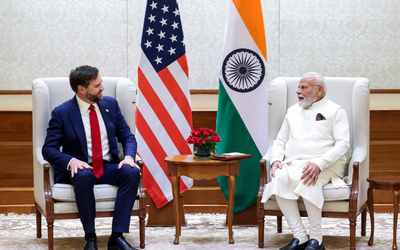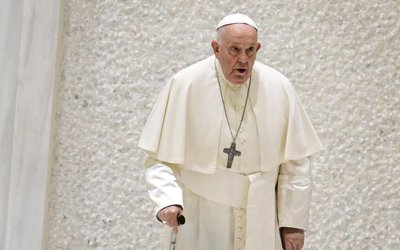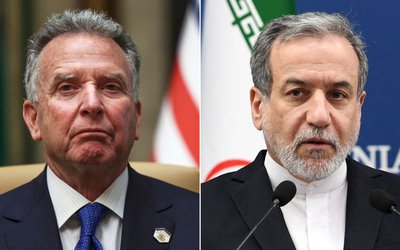
Last month, the long-standing Sino–Indian territorial dispute resurfaced, once again, when Beijing requested New Delhi not to include any student from Arunachal Pradesh, a state it claims as its own, in the delegation to the annual India-China youth exchange. Just a few days later, in what was seen as a veiled diplomatic attack, India allowed Taiwanese Vice President Wu Den–yih a layover at Delhi airport as he travelled to Rome via the Indian capital. Despite clinging onto its one China policy and not recognizing the tiny island nation, India’s gesture came off as almost an act of retaliation.
The two events took place at a time when India was in the midst of national election. More importantly, they occurred at a time when the election is expected to bring BJP candidate Narendra Modi at the helm of affairs in the world's second most populous country after China. Modi’s foreign policy until now has largely been an object of speculation. In the context of the growing geopolitical rivalry between the two countries, his foreign policy especially towards China is now being watched closely.
Modi has often been vocal in his criticism of the United Progressive Alliance (UPA) government's handling of Chinese incursions across the Line of Actual Control. He had, however, stopped short of making any scathing attack against the Chinese. But last month, addressing a rally at Pasaghat, 35 kms from the Chinese border in Arunachal Pradesh, the BJP candidate came down hard on China. He criticized its "expansionist" attitude and said that Beijing should focus more on development and prosperity. Referring to the Chinese claim over Arunachal Pradesh, he strongly asserted that no power could take away even an inch from India.
Although Modi’s speech indicated a tougher foreign policy under the new government that he is widely expected to lead, a major policy shift is less likely. In fact, Sino-Indian relationship is likely to see more positive interactions with pragmatism prevailing on both sides. Economic growth, which has been Modi’s main election agenda should underpin his foreign policy as well. Growth of India’s booming economy will in no way be possible by locking horns with the world’s second largest economy that is being projected to move further by the end of the year to replace the United States at the top. Hence it becomes imperative for Modi to seek a smooth relationship with China. His party too has hinted that trade would be one of the main agendas in relations with China. The bilateral trade between the two countries stood at around $60 billion last year. Although this was a sharp decline from the previous years, China stands as the top trading partner to India. In this context, Modi’s primary focus would be to go hand in hand with China to achieve the targeted trade of $100 billion by 2015. Not just that, the Gujarat Chief Minister would also look at addressing India’s trade deficit of about $30 Billion by increasing Indian exports to the Dragon land.
Given Modi’s already existing equation with China with focus on economic ties, it is unlikely that he would do anything radical to strain the relationship. Chinese investments have a major role in making Gujarat an economic powerhouse. Last year alone, about 100 Chinese investors decided to put in billions of dollars to develop an industrial park in the state. As the Chief Minister of Gujarat, Modi has already made four visits to the country famously proclaiming once that China had a special place in his heart. As Modi will be inheriting an economy where GDP growth has plunged from more than 9 percent in the 2000s to 4.7 percent in the last quarter of this year, he will not jeopardize the economic opportunities that come from closer engagement with China, regardless of his stand on territorial issues.
The Chinese, too, have begun to see the positives of Modi coming to power. There have been comments in the Chinese media, which has been carefully following the ongoing elections, that as a pragmatic and assertive political leader, Modi would bring his style into the Sino-India relationship and that more economic interactions could be expected should Modi come to power. Three years ago, Modi was given a red carpet welcome during a visit to China where he met top political leaders and was said to have struck many business deals for Gujarat.
What would this spell for Nepal, an immediate neighbor of both the countries? Although there have been apprehensions in some quarters that Modi’s win in India could endanger Nepal’s secular political transition under a republican set-up and that his perceived hard-line vis-a-vis China could create difficult situation for Nepal strong economic imperatives in the relations between India and China can be expected to be a boon rather than a bane for the Himalayan country sandwiched between the two.
- Ukrainian Crisis And The World (Dis)Order
- Apr 22, 2022
- China’s Cautious Steps In The Graveyard Of Empires
- Aug 18, 2021
- Foreign Aid On The Fence!
- Aug 08, 2021
- Communist Party of China centenary celebrations Reading between the lips
- Jul 14, 2021
- Second Wave Of Covid-19 In India: Deadly Blow To The Economy
- Jun 23, 2021
















